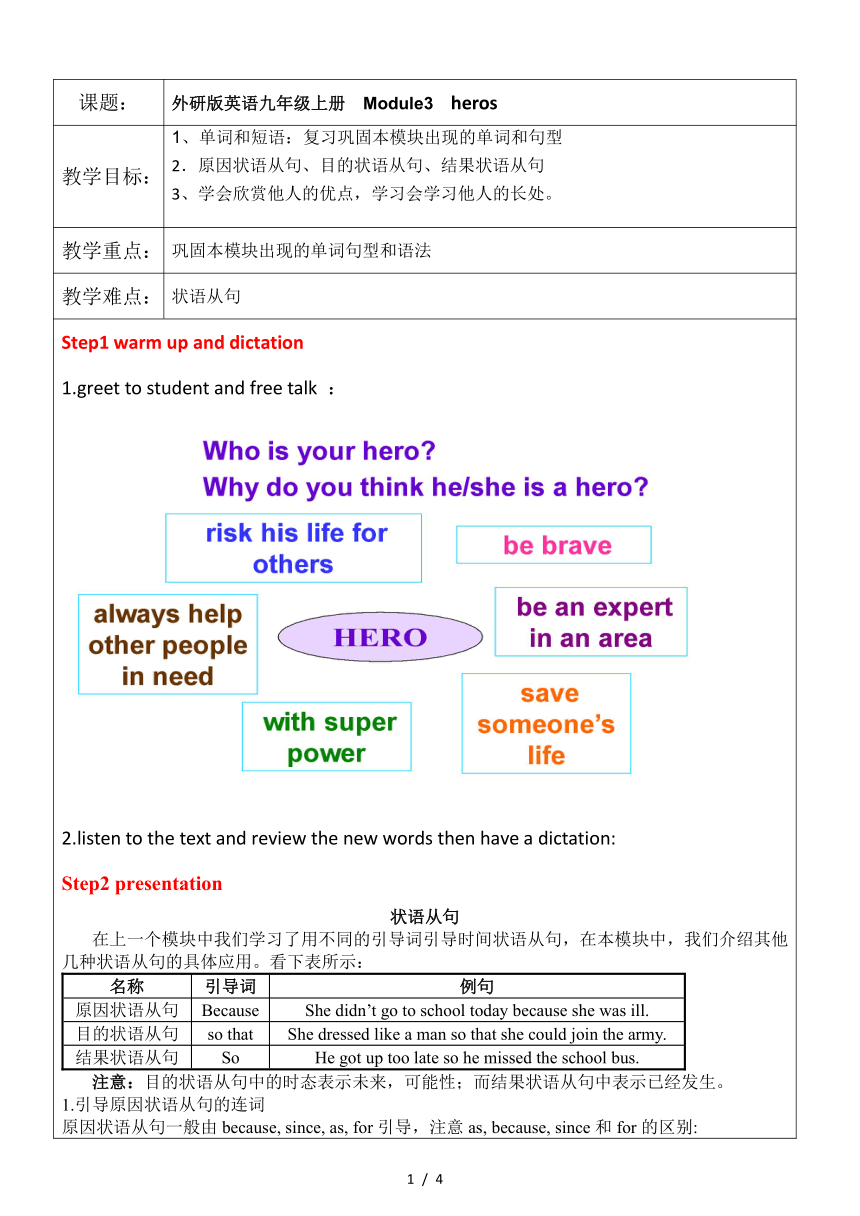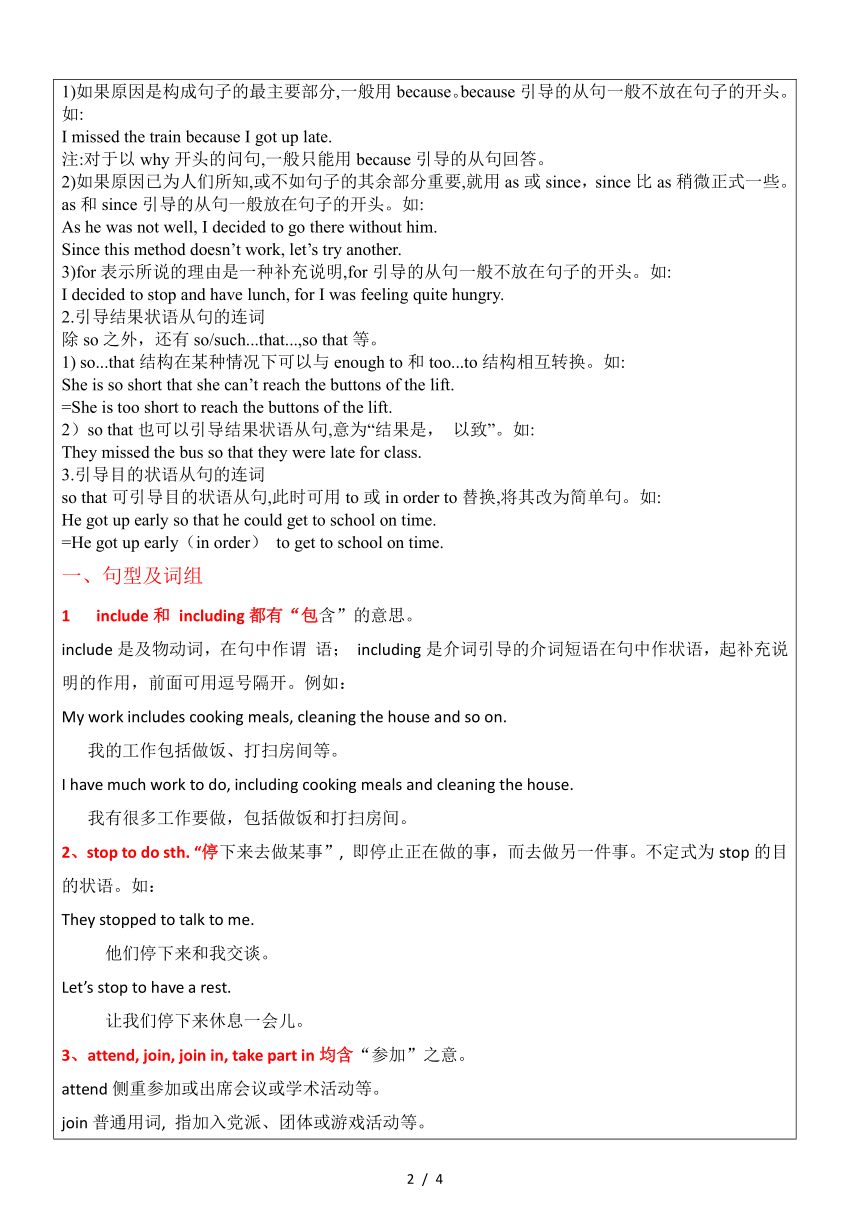外研版英语九年级上册Module 3 Heroes单元复习教案
文档属性
| 名称 | 外研版英语九年级上册Module 3 Heroes单元复习教案 |  | |
| 格式 | zip | ||
| 文件大小 | 109.3KB | ||
| 资源类型 | 教案 | ||
| 版本资源 | 外研版 | ||
| 科目 | 英语 | ||
| 更新时间 | 2021-02-15 11:14:50 | ||
图片预览


文档简介
课题:
外研版英语九年级上册
Module3
heros
教学目标:
1、单词和短语:复习巩固本模块出现的单词和句型
2.原因状语从句、目的状语从句、结果状语从句
3、学会欣赏他人的优点,学习会学习他人的长处。
教学重点:
巩固本模块出现的单词句型和语法
教学难点:
状语从句
Step1
warm
up
and
dictation
1.greet
to
student
and
free
talk
:
2.listen
to
the
text
and
review
the
new
words
then
have
a
dictation:
Step2
presentation
状语从句
在上一个模块中我们学习了用不同的引导词引导时间状语从句,在本模块中,我们介绍其他几种状语从句的具体应用。看下表所示:
名称引导词例句原因状语从句BecauseShe
didn’t
go
to
school
today
because
she
was
ill.目的状语从句so
thatShe
dressed
like
a
man
so
that
she
could
join
the
army.结果状语从句SoHe
got
up
too
late
so
he
missed
the
school
bus.
注意:目的状语从句中的时态表示未来,可能性;而结果状语从句中表示已经发生。
1.引导原因状语从句的连词
原因状语从句一般由because,
since,
as,
for引导,注意as,
because,
since和for的区别:
1)如果原因是构成句子的最主要部分,一般用because。because引导的从句一般不放在句子的开头。如:
I
missed
the
train
because
I
got
up
late.
注:对于以why开头的问句,一般只能用because引导的从句回答。
2)如果原因已为人们所知,或不如句子的其余部分重要,就用as或since,since比as稍微正式一些。as和since引导的从句一般放在句子的开头。如:
As
he
was
not
well,
I
decided
to
go
there
without
him.
Since
this
method
doesn’t
work,
let’s
try
another.
3)for表示所说的理由是一种补充说明,for引导的从句一般不放在句子的开头。如:
I
decided
to
stop
and
have
lunch,
for
I
was
feeling
quite
hungry.
2.引导结果状语从句的连词
除so之外,还有so/such...that...,so
that等。
1)
so...that结构在某种情况下可以与enough
to和too...to结构相互转换。如:
She
is
so
short
that
she
can’t
reach
the
buttons
of
the
lift.
=She
is
too
short
to
reach
the
buttons
of
the
lift.
2)so
that也可以引导结果状语从句,意为“结果是,
以致”。如:
They
missed
the
bus
so
that
they
were
late
for
class.
3.引导目的状语从句的连词
so
that可引导目的状语从句,此时可用to或in
order
to替换,将其改为简单句。如:
He
got
up
early
so
that
he
could
get
to
school
on
time.
=He
got
up
early(in
order)
to
get
to
school
on
time.
一、句型及词组
1
include和
including都有“包含”的意思。
include是及物动词,在句中作谓
语;
including是介词引导的介词短语在句中作状语,起补充说明的作用,前面可用逗号隔开。例如:
My
work
includes
cooking
meals,
cleaning
the
house
and
so
on.
我的工作包括做饭、打扫房间等。
I
have
much
work
to
do,
including
cooking
meals
and
cleaning
the
house.
我有很多工作要做,包括做饭和打扫房间。
2、stop
to
do
sth.
“停下来去做某事”,
即停止正在做的事,而去做另一件事。不定式为stop的目的状语。如:
They
stopped
to
talk
to
me.
他们停下来和我交谈。
Let’s
stop
to
have
a
rest.
让我们停下来休息一会儿。
3、attend,
join,
join
in,
take
part
in均含“参加”之意。
attend侧重参加或出席会议或学术活动等。
join普通用词,
指加入党派、团体或游戏活动等。
join
in表示“加入;参加(某种活动)”,in之后接名词或v.-ing形式;表示“参加某人的某种活动”时,可用join
sb??in
(doing)
sth
。
take
part
in侧重参加某项群众性、集体性的事业、工作或活动,突出参加者在其中发挥一定的作用。
4、abroad是副词,不是名词,因此不能与
in,
to,
at
等介词连用;其前也不用冠词:
正:He
went
abroad
last
year.
他去年出国了。
误:He
went
to
abroad
last
year.
误:He
went
to
the
abroad
last
year.
abroad
之前虽不能用
in,
to
之类的介词,但可用介词
from:
He
just
came
back
from
abroad.
他刚从国外回来。
5、give
up
放弃;戒除
It
is
a
pity
to?give
up?the
job.??
要放弃这份工作,真是遗憾。
Do
you
think
you
can?give
up?the
bad
habit???
你觉得你能够改掉这个坏习惯吗?
The
doctor
advised
me
to?give
up
smoking.??
医生建议我戒烟。
注意:如果宾语是代词,就必须放在give
和up之间;如果是名词,则既可插在之间,也可放在动词后。
6、die
for
为了
...
而死;为…而献身;急需(某物)
Let
us
remember
the
brave
who
died
for
the
peace
of
the
world.??
让我们永远怀念为世界和平献身的勇士们。
I'm
dying
for
a
cup
of
tea.
我很想喝杯茶。
die
of
死于(疾病,?感情,?饥寒等)
The
beggar
died
of
hunger
and
cold.
?
这个乞丐死于饥饿和寒冷。
die?from?死于…
(事故,?外伤)
The
old
man
died
from
a
traffic
accident.
那位老人死于交通事故。
7、
wounded
adj.
受伤的
The?wounded?policeman
is
now
out
of
danger.??
受伤的警察已经脱离危险。
the
wounded
伤员
the与某些形容词连用,相当于复数的普通名词,表示一类人。例如:?
the?young?青年???
the?old?老年?
the?poor?穷人???
the?rich?富人?
the?sick?病人
8、take
care
of
照顾;护理
He's
old
enough
to?take
care
of?himself.
他大了,能照顾自己了。
I'll?take
care
of?your
children
while
you
are
away.??
你不在时我会照顾你的孩子的。
近义短语:
look
after
9、manage
to
do,
try
to
do
的区别
manage
to
do指设法做成/完成某事,
含有成功之义;
try
to
do指争取做成某事,
但不一定成功。例如:
He
managed
to
get
the
work
done
with
very
little
help.
在没有多少帮助的情况下,他把工作完成了。
We
tried
to
stop
him
smoking
in
bed
but
he
would
do
it.
我们试图阻止他在床上吸烟,但他就是不听
教学反馈:
/
外研版英语九年级上册
Module3
heros
教学目标:
1、单词和短语:复习巩固本模块出现的单词和句型
2.原因状语从句、目的状语从句、结果状语从句
3、学会欣赏他人的优点,学习会学习他人的长处。
教学重点:
巩固本模块出现的单词句型和语法
教学难点:
状语从句
Step1
warm
up
and
dictation
1.greet
to
student
and
free
talk
:
2.listen
to
the
text
and
review
the
new
words
then
have
a
dictation:
Step2
presentation
状语从句
在上一个模块中我们学习了用不同的引导词引导时间状语从句,在本模块中,我们介绍其他几种状语从句的具体应用。看下表所示:
名称引导词例句原因状语从句BecauseShe
didn’t
go
to
school
today
because
she
was
ill.目的状语从句so
thatShe
dressed
like
a
man
so
that
she
could
join
the
army.结果状语从句SoHe
got
up
too
late
so
he
missed
the
school
bus.
注意:目的状语从句中的时态表示未来,可能性;而结果状语从句中表示已经发生。
1.引导原因状语从句的连词
原因状语从句一般由because,
since,
as,
for引导,注意as,
because,
since和for的区别:
1)如果原因是构成句子的最主要部分,一般用because。because引导的从句一般不放在句子的开头。如:
I
missed
the
train
because
I
got
up
late.
注:对于以why开头的问句,一般只能用because引导的从句回答。
2)如果原因已为人们所知,或不如句子的其余部分重要,就用as或since,since比as稍微正式一些。as和since引导的从句一般放在句子的开头。如:
As
he
was
not
well,
I
decided
to
go
there
without
him.
Since
this
method
doesn’t
work,
let’s
try
another.
3)for表示所说的理由是一种补充说明,for引导的从句一般不放在句子的开头。如:
I
decided
to
stop
and
have
lunch,
for
I
was
feeling
quite
hungry.
2.引导结果状语从句的连词
除so之外,还有so/such...that...,so
that等。
1)
so...that结构在某种情况下可以与enough
to和too...to结构相互转换。如:
She
is
so
short
that
she
can’t
reach
the
buttons
of
the
lift.
=She
is
too
short
to
reach
the
buttons
of
the
lift.
2)so
that也可以引导结果状语从句,意为“结果是,
以致”。如:
They
missed
the
bus
so
that
they
were
late
for
class.
3.引导目的状语从句的连词
so
that可引导目的状语从句,此时可用to或in
order
to替换,将其改为简单句。如:
He
got
up
early
so
that
he
could
get
to
school
on
time.
=He
got
up
early(in
order)
to
get
to
school
on
time.
一、句型及词组
1
include和
including都有“包含”的意思。
include是及物动词,在句中作谓
语;
including是介词引导的介词短语在句中作状语,起补充说明的作用,前面可用逗号隔开。例如:
My
work
includes
cooking
meals,
cleaning
the
house
and
so
on.
我的工作包括做饭、打扫房间等。
I
have
much
work
to
do,
including
cooking
meals
and
cleaning
the
house.
我有很多工作要做,包括做饭和打扫房间。
2、stop
to
do
sth.
“停下来去做某事”,
即停止正在做的事,而去做另一件事。不定式为stop的目的状语。如:
They
stopped
to
talk
to
me.
他们停下来和我交谈。
Let’s
stop
to
have
a
rest.
让我们停下来休息一会儿。
3、attend,
join,
join
in,
take
part
in均含“参加”之意。
attend侧重参加或出席会议或学术活动等。
join普通用词,
指加入党派、团体或游戏活动等。
join
in表示“加入;参加(某种活动)”,in之后接名词或v.-ing形式;表示“参加某人的某种活动”时,可用join
sb??in
(doing)
sth
。
take
part
in侧重参加某项群众性、集体性的事业、工作或活动,突出参加者在其中发挥一定的作用。
4、abroad是副词,不是名词,因此不能与
in,
to,
at
等介词连用;其前也不用冠词:
正:He
went
abroad
last
year.
他去年出国了。
误:He
went
to
abroad
last
year.
误:He
went
to
the
abroad
last
year.
abroad
之前虽不能用
in,
to
之类的介词,但可用介词
from:
He
just
came
back
from
abroad.
他刚从国外回来。
5、give
up
放弃;戒除
It
is
a
pity
to?give
up?the
job.??
要放弃这份工作,真是遗憾。
Do
you
think
you
can?give
up?the
bad
habit???
你觉得你能够改掉这个坏习惯吗?
The
doctor
advised
me
to?give
up
smoking.??
医生建议我戒烟。
注意:如果宾语是代词,就必须放在give
和up之间;如果是名词,则既可插在之间,也可放在动词后。
6、die
for
为了
...
而死;为…而献身;急需(某物)
Let
us
remember
the
brave
who
died
for
the
peace
of
the
world.??
让我们永远怀念为世界和平献身的勇士们。
I'm
dying
for
a
cup
of
tea.
我很想喝杯茶。
die
of
死于(疾病,?感情,?饥寒等)
The
beggar
died
of
hunger
and
cold.
?
这个乞丐死于饥饿和寒冷。
die?from?死于…
(事故,?外伤)
The
old
man
died
from
a
traffic
accident.
那位老人死于交通事故。
7、
wounded
adj.
受伤的
The?wounded?policeman
is
now
out
of
danger.??
受伤的警察已经脱离危险。
the
wounded
伤员
the与某些形容词连用,相当于复数的普通名词,表示一类人。例如:?
the?young?青年???
the?old?老年?
the?poor?穷人???
the?rich?富人?
the?sick?病人
8、take
care
of
照顾;护理
He's
old
enough
to?take
care
of?himself.
他大了,能照顾自己了。
I'll?take
care
of?your
children
while
you
are
away.??
你不在时我会照顾你的孩子的。
近义短语:
look
after
9、manage
to
do,
try
to
do
的区别
manage
to
do指设法做成/完成某事,
含有成功之义;
try
to
do指争取做成某事,
但不一定成功。例如:
He
managed
to
get
the
work
done
with
very
little
help.
在没有多少帮助的情况下,他把工作完成了。
We
tried
to
stop
him
smoking
in
bed
but
he
would
do
it.
我们试图阻止他在床上吸烟,但他就是不听
教学反馈:
/
同课章节目录
- Module 1 Wonders of the world
- Unit 1 It's more than 2,000 years old.
- Unit 2 The Grand Canyon was not just big.
- Unit 3 Language in use
- Module 2 Public holidays
- Unit 1 My family always go somewhere interesting a
- Unit 2 We have celebrated the festival since the f
- Unit 3 Language in use
- Module 3 Heroes
- Unit 1 She trained hard,so she became a great play
- Unit 2There were few doctors, so he had to work ve
- Unit 3 Language in use
- Module 4 Home alone
- Unit 1 I can look after myself, although it won’t
- Unit 2 I became so bored with their orders that I
- Unit 3 Language in use
- Module 5 Museums
- Unit 1 Don't cross that rope!
- Unit 2 If you ever go to London, make sure you vis
- Unit 3 Language in use
- Module 6 Problems
- Unit 1 If I start after dinner, I'll finish it be
- Unit 2 If you tell him the truth now, you will sho
- Unit 3 Language in use
- Revision Module A
- Module 7 Great books
- Unit 1 We're still influenced by Confucius's idea
- Unit 2 It is still read and loved.
- Unit 3 Language in use
- Module 8 Sports life
- Unit 1 Daming wasn't chosen for the team last time
- Unit 2 He was invited to competitions around the w
- Unit 3 Language in use
- Module 9 Great inventions
- Unit 1 Will computers be used more than books in t
- Unit 2 Will books be replaced by the Internet?
- Unit 3 Language in use
- Module 10 Australia
- Unit 1 I have some photos that I took in Australia
- Unit 2 The game that they like most is Australian
- Unit 3 Language in use
- Module 11 Photos
- Unit 1 He's the boy who won the photo competition
- Unit 2 The photo which we liked best was taken by
- Unit 3 Language in use
- Module 12 Save our world
- Unit 1 If everyone starts to do something, the wor
- Unit 2 Repeat these three words daily: reduce, reu
- Unit 3 Language in use
- Revision Module B
